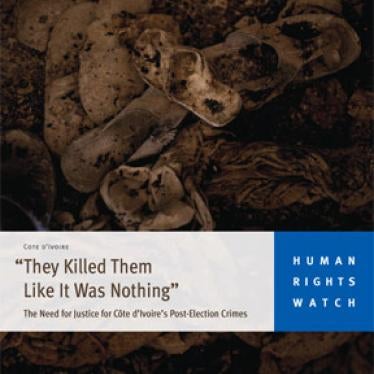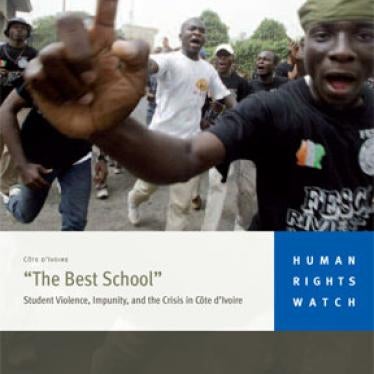(Nairobi) – Ghanaian authorities should ensure fair, credible justice for an Ivorian militia leader arrested on January 17, 2013, Human Rights Watch said today. The former leader of the Young Patriots militia, Charles Blé Goudé, is accused of serious crimes allegedly committed under his command during Côte d’Ivoire’s 2010-2011 violent post-election crisis.
Former President Laurent Gbagbo appointed Blé Goudé as his youth minister in December 2010, formalizing a longstanding relationship between the Young Patriots and Gbagbo’s security forces. Blé Goudé fled Côte d’Ivoire to Ghana in April 2011, and has been rumored to move among several West African countries since then. Ivorian authorities issued an arrest warrant against Blé Goudé in mid-2011 for violent crimes and economic crimes during the post-election crisis.
“For almost a decade, militiamen from Blé Goudé’s Young Patriots terrorized northern Ivorians and West African immigrants in violence perpetrated on political and ethnic lines, with many victims beaten to death, shot, or burned alive at illicit checkpoints,” said Corinne Dufka, senior West Africa researcher at Human Rights Watch. “Blé Goudé’s arrest is a significant opportunity to continue the process of accountability for victims from one side of the crisis.”
A key issue for Blé Goudé to answer is whether he incited crimes during the post-election period. On February 25, 2011, in a speech broadcast widely on national television and radio, Blé Goudé called on his followers to set up neighborhood roadblocks and “denounce” foreigners – a term the Gbagbo camp often used to signify northern Ivorians and West African immigrants. Human Rights Watch documented a sharp increase in violence by pro-Gbagbo militias, generally along ethnic or religious lines, in the days following Blé Goudé’s speech.
It is unclear whether Ghana will seek to prosecute Blé Goudé domestically or extradite him. Before considering extradition proceedings to Côte d’Ivoire, Ghanaian authorities would have to satisfy their responsibilities under the Convention against Torture, and ensure that Blé Goudé would not be subject to torture or inhuman, cruel, or degrading treatment, Human Rights Watch said.
In a report published in November 2012, Human Rights Watch documented widespread inhuman treatment and some cases of torture in military detention sites in Abidjan, following security threats against Côte d’Ivoire in August and September. The UN assistant secretary-general for human rights and the Human Rights Council-appointed independent expert on human rights in Côte d’Ivoire have likewise reported in recent weeks on inhuman treatment and torture in Ivorian detention sites.
“Blé Goudé’s arrest shows that Ghanaian authorities are taking steps to ensure the country will not be used as a safe haven from justice,” Dufka said. “They now need to accord Blé Goudé his full due process rights, including ensuring that there is no credible risk of inhuman treatment or torture if they extradite him to Côte d’Ivoire.”
The International Criminal Court (ICC) opened an investigation in October 2011 into serious crimes committed in Côte d’Ivoire. In November 2011, the Ivorian government surrendered Gbagbo to The Hague, where he faces four counts of crimes against humanity. In October 2012, the court unsealed an arrest warrant against the former first lady, Simone Gbagbo, for crimes against humanity, alleging that she acted as Laurent Gbagbo’s “alter ego” in overseeing atrocities in Côte d’Ivoire. She remains in custody in Côte d’Ivoire, where she is being tried for genocide, among other crimes, for acts committed during the post-election crisis. The ICC has yet to publicly issue any other arrest warrants for crimes committed in Côte d’Ivoire, including against anyone from the Ouattara camp.
Since the end of the post-election crisis in May 2011, the Ivorian government has repeatedly promised impartial justice for the grave crimes committed by both pro-Gbagbo forces and pro-Ouattara forces. Civilian and military prosecutors have collectively charged more than 150 individuals with post-election crimes. However, none of those arrested, much less charged, with violent crimes (crimes de sang, in French)come from the pro-Ouattara forces.
“While the arrest of Blé Goudé continues the important steps toward justice for the grave crimes committed by pro-Gbagbo forces, victims on the other side remain without recourse to justice in Côte d’Ivoire or at the ICC,” Dufka said. “The one-sided justice for Côte d’Ivoire’s post-election violence needs to swiftly change if the Ouattara government is to break from Côte d’Ivoire’s dangerous legacy of impunity.”








